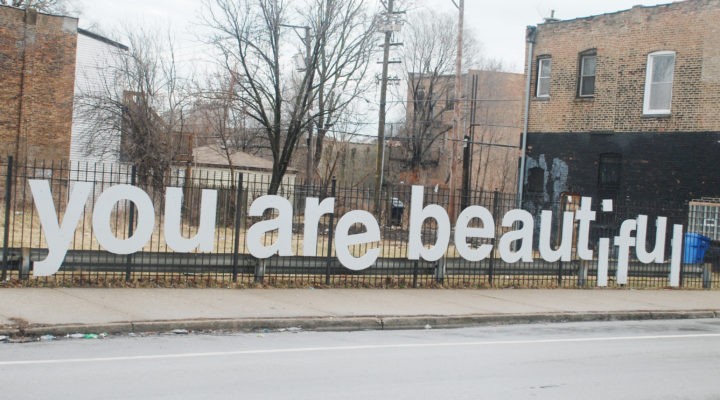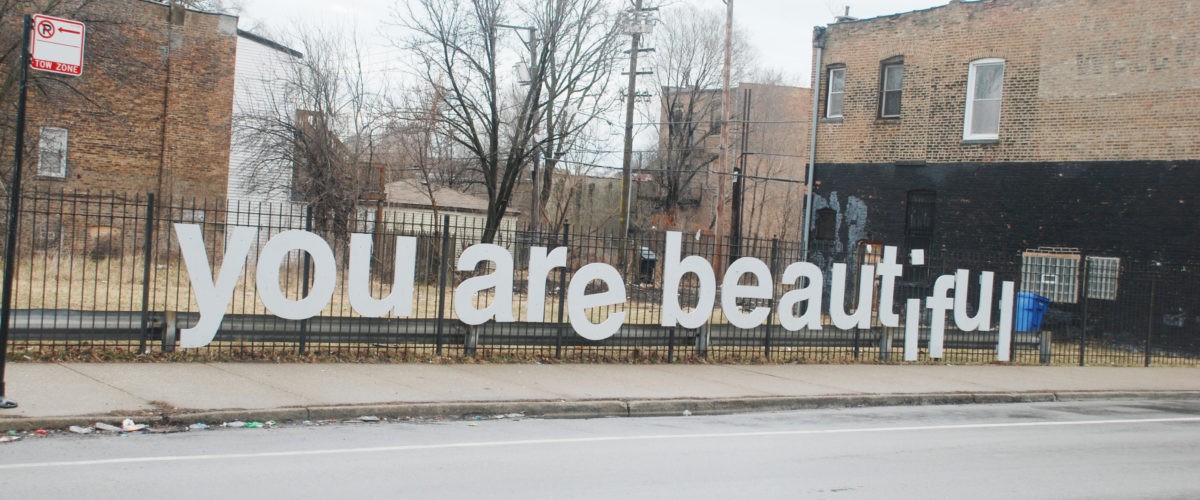Jonathan Brooks moved his family into their new address in the dead of night. He didn’t want his neighbors in the tough Englewood section of Chicago to see the computers or televisions or nice furniture his family owned.
He told his daughters they could play only in the fenced yard and were never to answer the door. They always left a light shining in the house.
 Brooks grew up in the area, but he was educated out of state, was upwardly mobile and held an architecture degree. He rejected job offers in the Southeast to return home when his mother had a stroke.
Brooks grew up in the area, but he was educated out of state, was upwardly mobile and held an architecture degree. He rejected job offers in the Southeast to return home when his mother had a stroke.
And now he was 26 and pastor of Canaan Baptist Church — and afraid to become a part of the neighborhood that hadn’t changed since he left it for college. “We can live in this neighborhood but we’re not a part of it,” he thought.
Then one night coming home from Bible study, gunshots rang out next door. The sound shook Brooks because he had moved his family to be nearer the church and he immediately felt guilty, like he’d put them into unnecessary danger.
As ambulance and police arrived, Brooks wanted to learn what happened, but he didn’t know anyone to ask. He saw a woman on her porch next door, so he walked over. He’d never met Barbara because Brooks had walled off his family. Yet, she knew everything about him — his name, his schedule, the wife and children’s names and where he was pastor.
Barbara said he should ask the boys at the house where all the action was what had happened. He didn’t want to go and suggested she go since she knows them. She assured him they were good guys, and he reluctantly walked over, stepped up to the porch and said, “Hey guys.”
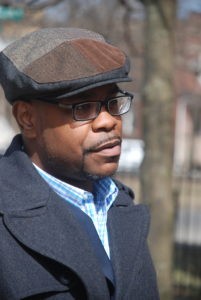 Their first reaction was to shout, “What?” and then they recognized him, sat back and said, “Oh, hey pastor.” Like Barbara, they knew all about the pastor and his family. They assured him they were the guardians of that street and they would take care of issues.
Their first reaction was to shout, “What?” and then they recognized him, sat back and said, “Oh, hey pastor.” Like Barbara, they knew all about the pastor and his family. They assured him they were the guardians of that street and they would take care of issues.
Later, when a man continually drove too fast through the neighborhood, the guys stopped him, surrounded his car and flipped it over.
“They were protecting us before we even knew who they were,” Brooks said. “I was living next door to the leaders of the neighborhood, and at that moment I realized how ashamed I was to think I was better than anyone else in our block. That changed everything.”
“I tell this story because it helps people understand how I became who I am,” said Brooks, a figure growing in national prominence through his leadership in encouraging churches to be essential community advocates.
Author of Church Forsaken: Practicing Presence in Neglected Neighborhoods, Brooks says that moving closer to community “is actually what God is talking about. I became a better person, more of who God intended me to be, when I got closer to my neighbors.”
Suddenly the prophet Jeremiah’s letter to the exiles in chapter 29 “jumped off the page to me,” he said. He wouldn’t have chosen to live in Englewood. He’d grown up and out and past that neighborhood. Living there felt like exile to him, exile from any “good” neighborhood where he could be living.
After that incident, though, he realized he didn’t just have a house, he had a neighborhood. His congregation isn’t just those 100 folks who show up to praise God and hear him preach on Sunday. His congregation is the neighborhood and beyond that, the city.
An unexpected return to home
Brooks was one of those guys who “made it out” of a neighborhood where poverty, narrative, low expectations and violence tug and pull on the pant legs of anyone who tries to climb out. He went south, earned an architecture degree from Tuskegee University and didn’t intend to return. But when mom had a stroke, he came home to help. He got an architecture job in Chicago and hated it. Couldn’t stand the long hours in front of a computer, attending to the minute, tedious details involved in designing buildings.
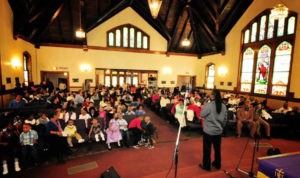
This photo taken before the COVID-19 pandemic shows a full room for worship at Canaan Community Church in Chicago. (Photo by Curtis Davis shared courtesy of the church)
His family was attending Canaan Baptist Church, a fairly new church meeting in a century-old building that started as an Episcopal Methodist church. Creeping crime and poverty in the mid-1980s prompted uneasy residents to flee, draining the neighborhood of stability.
Canaan Baptist was a split of young people from Ebenezer Missionary Baptist Church, the church where Brooks grew up. Brooks went to Canaan when he came back home because that’s where his friends were. Founding Pastor L. Edward Simpson offered him a spot as youth minister until he figured out what he wanted to do.
“I took to it like a duck to water,” Brooks recalled. He loved youth ministry so much he started working as a substitute teacher in the local school system and “fell in love with the classroom.”
He earned a master’s degree in education while continuing to teach. Life was crazy, being newly married, his wife pregnant, going to school, with a new job at church and substitute teaching. But he was loving it all.
Numbers of youth at church grew from six to 75; he was popular in school and making a difference among students who received no motivation from home. He was calling some at their homes in the morning to get them up and make sure they left for school on time.
Brooks had a week to discern his direction, either to assume church leadership or see it close.
One constantly tardy fifth grader told Brooks: “You ought to be glad I’m here at all. Nobody in my family has ever finished school. Nobody ever thought it was important. Some days I wake up late. No one gets me up.”
Brooks started picking the kid up for school, which got Brooks in trouble with the principal because no teacher is supposed to have kids in their car or home. But that’s the kind of difference he was making in his harried, hurried life. And then the other shoe dropped.
After being youth minister for five years, Pastor Simpson told Brooks in his office one day that the next Sunday he was going to resign and he wanted to recommend that Brooks succeed him.
Simpson, who was returning to North Carolina, was afraid his abrupt departure would cause issues in the church. So, he gave Brooks an ultimatum. Either Brooks would agree to become pastor or Simpson would announce at the time of his resignation that he was going to close the church. Church covenants gave him that authority.
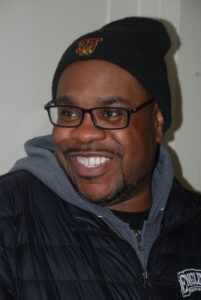
In addition to being pastor, author and community developer, Jonathan Brooks is a hip hop artist with four albums recorded and a new solo project called “Can I Get An Amen?” Hip hop came out of the Bronx in New York City as an expression of resisting injustice and oppression. “I’ll guarantee you the majority of people in that congregation have been influenced by hip hop culture,” he said. “In what way are you connecting with them? We’re missing out because we decided to demonize hip hop culture instead of using it and relating to it.”
Brooks had a week to discern his direction, either to assume church leadership or see it close. His wife, Micheal, who already had said “yes” to his being an architect, then “yes” to youth minister and “yes” again to teacher, told him — against his expectations — “You need to take this. You can’t abandon those kids.”
So the next Sunday, Simpson resigned, told the church that God always has a ram in the bush and that Brooks was to be the new pastor, and he walked out the door and stepped into his already packed U-Haul and drove away.
Stunned, a church trustee stood to speak highly of Brooks and suggested the congregation sing a few songs.
The church accepted Brooks, and he kept his head above water discovering what it meant to be pastor. But he didn’t really become pastor until after the events of Mother’s Day 2006.
Mother’s Day turning point
Mother’s Day in the Black church is huge. Husbands and sons come to church that day because mom asks them. They wear white flowers if mom is alive or red flowers if their mother has passed.
Two months into his pastorate, Brooks was leading Canaan like he’d seen his predecessors, preaching from the pulpit, wearing a suit with his dreadlocks pulled into a pony tail. Shoes shined, demeanor distant, authoritative.
Many of Canaan’s members had not heard Brooks preach yet, and they were coming on Mother’s Day to “check this young guy out.”
The service was going well when just as Brooks rose to preach, a young man who’d come up in the youth group was summoned outside by a buddy. Deontae had no sooner stepped outside than he was jumped by 10 to 12 guys who started beating him. Brooks leapt from the pulpit, but his mother tried to stop him, saying as the pastor he didn’t need to get involved in such things.
He heard three gunshots and his heart sank. But the shots were from a police officer in the congregation who broke up the fight. Although Brooks tried to play it all down, he realized he wasn’t handling it well. The congregation was in turmoil, people were crying, kids were scared. He walked to the pulpit, realizing nothing he’d prepared on this, his coming-out day, fit the situation.
When he got to the lectern, he asked the congregation: “Why was that OK? Why is it OK for a gang to have a fight on our doorstep? We say we want to represent the Lord. Why, if this place is so special to us, does it seem to have no value to our neighbors? We’ve got to figure that out.”
That incident and that day launched a journey about what it means to love your neighbor as yourself — and the implications it has for loving your neighborhood. Canaan discovered and started to live out its theme, “The church where love makes the difference.”
‘Love is proximal’
Love can’t make a difference if love remains distant.
“We found out love is proximal,” Brooks said. “Jonathan loved David and stayed at his side. Jesus came down to live among us. Love is not without proximity. We have to live with neighbors.”
The denominational identity of Canaan Baptist was a stumbling block to many neighbors. While most African American families have a historical church connection, they often grew up in other denominations and Brooks heard time and again that “Grandma would be upset if I went to that Baptist church, even though I like what you’re doing over there.”
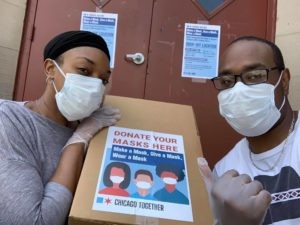 They became “community church” because community was their focus. “If you love Jesus and you love your neighbor, you’re welcome here,” Brooks declared. “We’re about unity here, not uniformity.”
They became “community church” because community was their focus. “If you love Jesus and you love your neighbor, you’re welcome here,” Brooks declared. “We’re about unity here, not uniformity.”
Some folks didn’t like it and left. Others said they’d been waiting for just such a church. And in 2011 “Canaan Baptist” became “Canaan Community.” Its community is Englewood, a Chicago near-suburb with a reputation for violence that makes experienced Uber drivers and pizza delivery drivers roll quickly through stop signs because a moving target is harder to hit.
To Brooks, Englewood is an enigma. While its narrative still is brokenness, high crime, vacant lots and empty homes, it’s also a model of resident-initiated transformation, a transformation encouraged and led in large part by Brooks and Canaan.
Residents established the Residents Association of Greater Englewood that is working hard for unity and to raise the level of expectation. A rebranding campaign called “Englewood Rising” tries to redefine the area as one of beauty and not brokenness. The parks and majestic homes hearken to a day when 63rd and Halstad in Englewood was second as an economic engine only to Chicago’s Magnificent Mile along Lake Shore Drive.
Now area homes and parks more resemble an aging movie star too long absent from her stylist.
A minister’s alliance group, called “One Englewood, One Church,” brings 20 pastors together weekly to envision initiatives that will support community, asking each other, “How can we be the church in Englewood?”
Chicago’s leadership is taking notice of the community’s efforts. Mayor Lori Lightfoot has attended a service at Canaan, and Brooks’ number is on the speed dial of anyone who wants to make something happen in Englewood. And now that he has a book out, there is a national audience.
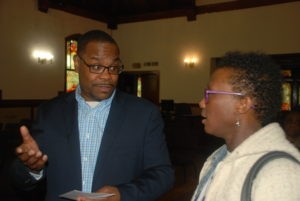
Brooks lingers after every service to visit with worshipers.
“There’s a lot of pull on me in different directions, so I’ve had to be intentional about staying local and being national,” Brooks said. “What I don’t desire is for ‘Pastah J’ to be my primary identity. If God says for me to do something else, I don’t want to lose my identity. Whether or not I’m pastor of Canaan, it wouldn’t change the way I engage in my community.”
When Brooks speaks to other groups about the slow transformation in Englewood, he is careful not to tell people how they can do what he did in their neighborhood. Instead, he shares what Englewood did and says now they need to figure out how to make it work where they live.
“Your context is different,” he said. “But the practice is the same. Be present, move closer to your community, listen well and be a part of what’s happening there, and it will come to you.
Change comes to Englewood
An area termed “neglected neighborhood” implies historical disinvestment. Now that RAGE and concerned leaders like Brooks are actively attracting investment, the city is taking interest and is incentivizing more growth.
In 2017, after residents talked with the president of a local college, he led the school to build a new city college campus on Halstad. Because of the college, US Bank built a branch across the street. Others needed space for neighborhood meetings, and the corner started to hum. A closed train station reopened.
RAGE wanted a big grocery store and in 2017 a Whole Foods opened there because the city — in an effort to fight food deserts — gave them land. The city was not incentivized to do that before Englewood residents organized and demanded better, healthy food options.
The first meeting to discuss bringing such a store to the neighborhood was at Canaan Community Church. It was the first of more than 100 meetings, and eventually residents helped design the store, decorate it and determine what should be in it. That included the fact that certain staples needed to be priced at a level available at other stores.
They also secured a commitment from Whole Foods on the ratio of community residents who would be employed there. And Whole Foods provides a room in the store for community meetings.
“That didn’t happen because of the church,” Brooks explained. “But none of this happens without the church.”
Church member Jackie Bolden admitted that not everyone embraced Brooks’ vision for community involvement. “One thing I know,” she said after a service, “there is an anointing on his life. If he says it, he’s doing it. I trust him, and because I trust I’m willing to be shepherded by him.”
Guns and funerals
Chicago is in the news because gun violence this year is 25% higher than the already high rate of previous years, despite Chicago’s strict gun laws. But Chicago is sandwiched between four states with lax laws, and every highway in the Midwest empties into Chicago. “As long as we’re surrounded by lax laws, that’s how it will be,” Brooks lamented.
In his first four years as pastor, he held 25 to 30 funerals of people under age 21. Sometimes families of both the victim and the perpetrator were in the service.
Gun violence and Brooks’ commitment to the neighborhood led him to offer Canaan as a place for funerals when victims’ families had no access to other venues. In his first four years as pastor, he held 25 to 30 funerals of people under age 21. Sometimes families of both the victim and the perpetrator were in the service.
“It took a toll on me,” Brooks said. “We had police presence at some of them. Gang members hung around. I’ve seen fights break out at funerals.”
In 2010, he decided to stop doing those funerals because the emotional toll was just too great. He continues to help where needed, but the services are not at Canaan.
Being the incarnational presence of God in those moments helped Brooks to understand restorative justice, learning to honor a life “whether you liked the person who died or not.”
Kusanya Cafe
One of the most significant neighborhood initiatives established Kusanya Café, opened in 2013 after a years-long, frustrating process. Kusanya is a Swahili word meaning “to gather together.”
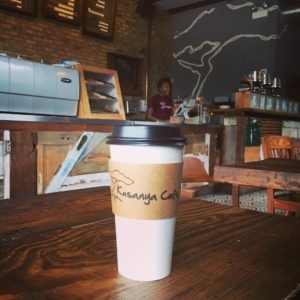 Gathering is important in community, and there are few gathering places in Englewood. People would have to go to another neighborhood to find a place to meet and talk about their own neighborhood.
Gathering is important in community, and there are few gathering places in Englewood. People would have to go to another neighborhood to find a place to meet and talk about their own neighborhood.
Initially the goal was to rent space, but real estate in the dilapidated area had its own problems. Instead of being cheap to rent, abandoned buildings required astronomical investment to renovate. Owners didn’t want to rent their property, they wanted to sell.
After searching five years for suitable space, neighborhood advocate Lauren Duffy cleaned out her savings and bought the whole building that now houses Kusanya, offices for Urban Farms, and her own apartment. Other spaces are available.
The café is furnished with things scavenged from the streets: doors and benches discarded in allies, tables made of planks found outside, chandeliers made from bottles hung on hangers with a light bulb in between.
“In more affluent neighborhoods, people do this stuff on purpose,” Brooks said over breakfast sandwich and coffee. “We had no choice. They’re being hipster, and we’re just trying to survive.”
Creating Kusanya was an adventure in frustration. The city wasn’t anxious to support opening a coffee shop in Englewood because officials didn’t have high expectations for its success and they didn’t want a resident initiative to fail. Rather than support the dream, regulations threw up hindrances and roadblocks.
One example: A building inspector said as the café was near opening that an electric box was three inches too close to a gas line. A volunteer electrician said he could make the change “right now,” if the inspector would give them a couple minutes. The inspector said his next open appointment was in six months.
Kusanya Café brought to Englewood an identity and gathering center that proclaims community.
Such frustrations created discouragement, and people dropped out. That’s when Canaan really stepped in to drive the dream to completion. Canaan became the fiscal agent for the project, and its volunteers transformed the space.
When Phil Sipka, who manages Kusanya, learned of the plans to open a coffee shop in Englewood, he quit what he was doing and started working at another coffee shop to learn the business. Kusanya opened in November 2013 to an enthusiastic celebration. All employees are from Englewood, and the first three employees were members of Canaan.
Having a coffee shop — a community gathering place — is something most neighborhoods take for granted. Such places occupy every other corner. Kusanya brought to Englewood an identity and gathering center that proclaims community.
“Every time I walk in there it’s a place of worship because I know it was a vision of God,” Brooks said.
Jahmal Cole, a champion of social justice and founder of My Block, My Hood, My City, wrote a book called It’s Not Regular: How to Recognize Injustice Hidden in Plain Sight.
He talks about being required to do things that “just aren’t regular.” Not being able to find a coffee shop was one. Or, if he wanted to get a bag of chips it was available only at a gas station because there was no grocery in the neighborhood. And then, he had to ask for it through a plexiglass barrier. “It’s just not regular.”
“When you don’t have any choice, that’s not regular,” Brooks explained. “We’re trying to shift from the way things are, to move from memory to imagination. We want not only to challenge people outside our community, but people inside our community, to wake them up to what’s not regular.”
Having a local coffee shop is something regular.
Change agent
The church is best positioned to be a change agent in communities because church DNA recognizes the inherent worth of people.
“Everybody has dignity,” Brooks believes. “Everyone deserves to live in a place that is abundant and meets their needs. Everyone has capacity, and everyone is made in the image of God. We already have that in our DNA.
“Churches also are places that amass the greatest resource in the world — human resources. We ask people to tell us what they need, and when they say what they need, we bring the volunteer resources.”
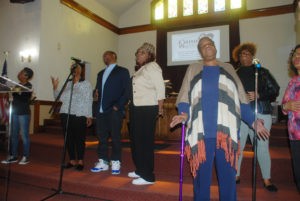
An impromptu choir sings praises at Canaan Community Church. Canaan also celebrates in worship through hip hop break dancers, rappers, and graffiti artist who spray paint illustrations while Pastor Jonathan Brooks preaches.
One of the issues for churches wanting to stick their toes in the water “to make a difference” is their unwillingness to let others lead, Brooks has found. When white churches want to bring help to “rescue” Englewood in a week of youth-led activities, Brooks usually just tells them to stay home, unless they are doing in their own neighborhoods what they want to do in Englewood.
“You don’t have a right to come into my neighborhood and do anything that you’re not doing in your community,” he said. “You don’t find single moms or poverty only in my neighborhood and not in yours.”
When enthusiastic youth breeze in for a week of hugs, smiles and selfies and leave, “it’s a bad look for our children,” Brooks said. “They get enough loss. They don’t need someone else to come in, build a relationship and leave.”
A journey, not a destination
Englewood is a large geographic area, as neighborhoods go. It’s four miles east to west and about three blocks north to south. Long and narrow. Population was 90,000 at its peak of energy. Today it’s closer to 30,000.
Winter wind blows debris, plastic, paper and cardboard across broad, rough streets to cling to 8-foot wrought iron fences surrounding car lots and other businesses. Brown is the overwhelmingly winter palette of the upper Midwest city, when everything isn’t covered by snow singed black by soot and exhaust.
“Jonathan looks out for others before looking out for himself. He don’t see bad in people. He always sees the good.”
Sonya Ecter, who drives 45 minutes to attend Canaan, recognizes that other people who have moved away from Englewood and come back “usually come back with an attitude. It’s all about ‘me.’ But Jonathan looks out for others before looking out for himself. He don’t see bad in people. He always sees the good.”
Maybe that’s illustrated in a recent sermon where he drew from Psalm 23 to talk about how God prepares a table in the presence of your enemies. Then he zipped to Jesus at the Last Supper when he told Judas, “Do what ya gotta do.”
“Your enemies don’t scare me,” Brooks told the congregation, as if Jesus himself were speaking. “Bring your haters to the table. If you want your enemy to be an ally maybe you ought to give them something of what you’ve got.”
He planted himself on the phrase “goodness and mercy will follow me” and with rising voice and prancing feet he shouted, “that means God is chasing you with goodness and mercy.”
Angelina Williams, who has known Brooks since he was a boy, said there is no magic formula to what is happening in Englewood through Brooks’ leadership of Canaan.
“It’s love,” she said. “God wouldn’t make it so complicated that we can’t figure it out. It’s love, and that’s who he is. It’s not something he drinks in the morning.
“This was initially an area of crime, no hope, poverty, isolation. No one seems to care about you. We’re all the same. Now, it’s a place where God wants to be present in the people who come here so we can introduce them to the Lord.”
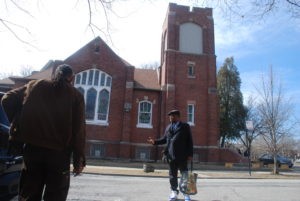
Pastor Jonathan Brooks speaks to neighbors outside Canaan Community Church.
Brooks see this as a journey, not a destination already reached; a future hope rather than an unavoidable history.
“We’re living in the ‘not yet,’ but there is some ‘already,’” he said. “What are we doing to claim the abundant life God has ordained for us? We’re working out of imagination rather than memory.”
Operating from memory means people live according to what went before them. Living through imagination embraces the possibility of new and better. Operating from memory means residents own the erroneous narrative they’ve been given.
When the drumbeat of media coverage keeps pounding that you live in the worst neighborhood in the city, “you can live in the neighborhood and not have that experience and still believe it,” Brooks reported. “The escapism narrative says success is getting out. We’re trying to change that, to help people know you don’t have to move out of your neighborhood to live in a better one.”
This story was made possible by generous gifts to BNG’s Storytelling Projects initiative from the Christ Is Our Salvation Foundation and the Eula Mae and John Baugh Foundation.

